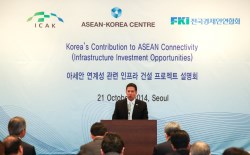



KOREAN FIRMS INVITED TO INVEST IN ASEAN CONNECTIVITY INFRASTRUCTURE
By: Embassy of the Republic of the Philippines, Seoul
SEOUL, 21 October 2014 – Philippine Ambassador to Korea Raul S. Hernandez called on leading Korean construction firms at a forum held in Seoul on Tuesday, 21 October 2014 to take advantage of existing opportunities to invest in critical infrastructure needed by ASEAN member states in the formation of the ASEAN Community by the end of 2015.

Philippine Ambassador to Korea Raul S. Hernandez delivers congratulatory remarks in his capacity as current chair of the ASEAN Committee in Seoul at the forum on KoreaŌĆÖs Contribution to ASEAN Connectivity (Infrastructure Investment Opportunities) held at the FKI Convention Center on Tuesday, 21 October 2014.(Photo credit: ASEAN-Korea Centre)
ŌĆ£This growing demand for critical infrastructure in the ASEAN region presents economic opportunities for Korean businesses. I see the response of Korean businesses to this demand as a win-win scenario for both ASEAN and Korea,ŌĆØ Ambassador Hernandez said in a congratulatory speech at the forum opening ceremonies at the FKI Convention Center.
ŌĆ£Infrastructure significantly contributes to enabling and empowering the 600 million-strong population of ASEAN,ŌĆØ he said. ŌĆ£Success in this task directly translates into greater demand for goods and services, even as it speeds up the movement of resources, facilitates a more equitable distribution of wealth and promotes a more predictable and benign social order.ŌĆØ
In welcome remarks, AKC Secretary General Hae-Moon Chung said KoreaŌĆÖs active participation in the implementation of the Master Plan on ASEAN Connectivity, approved at the 17th ASEAN Summit in Hanoi in October 2010, will be crucial to the efforts at building ASEAN Community in 2015.
Ambassador Chung said the ASEAN Community will open up business opportunities that will provide mutual benefits. ŌĆØKorea and ASEAN can forge an exemplary partnership whereby the lessons learned and experiences accumulated from ASEANŌĆÖs community building could be shared to deepening the Northeast cooperation and the wider East Asia integration.ŌĆØ
High-ranking government officials from ASEAN member states in charge of infrastructure investment attended the forum, with the Philippines represented by Trade and Industry Undersecretary Ponciano C. Manalo Jr., who gave a presentation of the infrastructure projects the Philippines is promoting as private-public partnership (PPP).
Undersecretary Manalo said infrastructure development is essential if the Philippines, which has exceeded the projected demands for power and energy, is to sustain its current rate of economic growth. It also needs to build more farm-to-market roads to improve on the current 18 percent of paved local roads, as well as build airports, seaports and railways for travel.
According to Undersecretary Manalo, the Philippines plans to double its infrastructure budget to 5 percent in 2016 from the current 2.5 percent of its GDP. Apart from physical infrastructure, the government has had to establish the rule of law and transparency in the bidding process for government-related projects in order to instil faith in good governance among the people.
Korean companies are more than welcome to bid for infrastructure projects related to physical and social connectivity, says Undersecretary Manalo, adding that firms such as Samsung, Hanjin, KEPCO, Hanhwa, Daewoo International, and Daerim, have a good track record in the Philippines, not only for investing in the country but also for engaging in CSR projects.
The 10-country ASEAN region boasts of a combined land area of some 4.4 million square kilometers, a population of 600 million and a combined GDP of US$2.3 trillion. The Asian Development Bank (ADB) estimates that some US$600 billion would be required annually to develop critical infrastructure needed to underwrite the regionŌĆÖs growth for the next 10 years.
Involvement in ASEAN connectivity projects, Ambassador Hernandez noted, ŌĆ£will allow Korean companies greater access to critical resources that, in turn, translates into greater competitiveness for Korean exports, and the sustainability of the Korean economy itselfŌĆØ as well as tap into ASEANŌĆÖs economic growth, which now averages 5.1 percent.
The forum was the main event in a program that started on Monday, 20 October 2014 with briefings and a lecture on cases and procedures of overseas project financing by the Korea Development Bank (KDB), KoreaŌĆÖs representative development financing bank. The whole afternoon of the 21st was devoted to one-on-one business meetings with Korean firms.
Apart from the Philippines, the other nine ASEAN member states sent senior officials from their respective government agencies in charge of public works, trade, transport ministries, investment coordination or economic and development planning.
In addition to the 12-15 minute presentations by each of the representatives of the 10 ASEAN member states on available investment opportunities in the specific infrastructure or PPP projects, a representative from the ADB gave a presentation on its major initiatives to finance connectivity and cases of project financing.
Also attending for the Philippines were officials from the Seoul-based Philippine Trade and Investment Center, led by Commercial Counsellor Nicanor S. Bautista, and the EmbassyŌĆÖs ASEAN officer, First Secretary and Consul Roderico C. Atienza.
This yearŌĆÖs forum was the result of last yearŌĆÖs pioneering ASEAN Connectivity Forum (Focused on Infrastructure), which became the first of its kind in Korea for providing Korean investors and constructors the latest information on the current status and challenges of the 2010 Master Plan leading to ASEAN Connectivity, as well as introducing ways to utilize PPP.
The organizer AKC was established as an intergovernmental organization with ten ASEAN Member States and Korea as its members in March 2009, the year which marked the 20th anniversary of Dialogue Partnership between ASEAN and Korea. It is observing the fifth year of its founding this year.
The forumŌĆÖs host, FKI, was founded in 1961 as a non-profit independent organization consisting of Korea's major conglomerates and associated members with the aim of helping promote sound economic policies, and of internationalizing the economy to further enhance KoreaŌĆÖs development and its free market economic system.
Established in 1976, ICAK is a Korean semi-public organization representing the interests of its 700 member firms in all matters relating to overseas construction and development activities.



